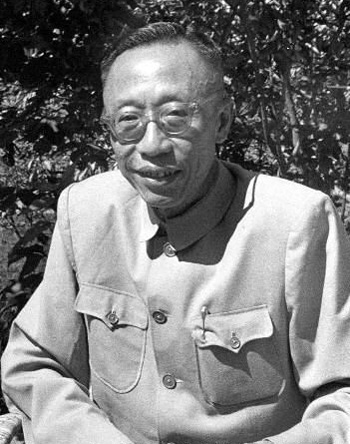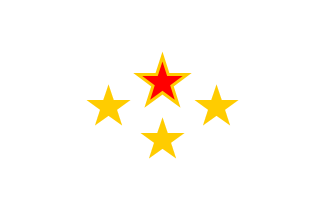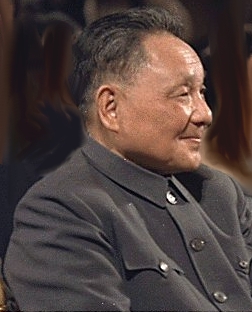Qilai! Qilai!
A history of Modern China
Deng Xiaoping (People's Party)
(1972 - 1985)
"The Great Reformer"
Deng Xiaoping's exile lasted from 1958 to 1972. In that fourteen years, he cultivated a new political party, one that had fundamentally changed China's landscape. The monolith of the Communist Party was no longer tenable; even with Chairman Aisin-Gioro and his moderating influences, the Party had little chance when the People's Party arrived, and many of it's members were restored to their former places in the Central Committee.
The sudden death of the Chairman in 1972 allowed for the master stroke to restore Deng Xiaoping to his office that he had taken away from him in 1958. Almost immediately after taking power, Deng began to cultivate people to support desires for political reform and the steps towards a proper Chinese state that could collaborate with all nations.
His first foreign relations step as leader of China came in 1973. both Vietnams, as well as North Korea and South Korea had, since the fall of Kim Il-sung and the Peace Accords, been at a state of relative peace, with very little hostility across the parallels. In a public statement, Deng expressed China's commitment to "the concepts of a unified Vietnam, and a unified Korea, and we urge the Peoples and Governments of those nations to collaborate closely on unification."
Deng, using his influence over North Vietnam (even after the death of Ho Chi Minh in 1969), convinced them to hold even more close-talks over reunification. The Chinese delegates to the summit in Hanoi proposed the "Two System In One Nation" plan. The establishment of a federalised state in Vietnam, with the Emperor serving as a constitutional figurehead, and the President of North Vietnam becoming the first united Head of Government. The North could continue socialist policies, while the South could continue capitalist policies; and that this could continue as long as the people felt it necessary.
China's only "but" with regards to Chinese and Korean unification, was that "no foreign soldiers be stationed along China's border". This meant the small US forces in South Vietnam stay out of the North, and that the piecemeal US forces in South Korea stay out of North Korea.
After lengthy negotiations, the Vietnamese agreed to the unification plan, and the Empire of Vietnam was proclaimed to span the entirety of Vietnam, and that "unification will be complete by 1975", as the two armies, navies, air forces and systems integrated. The United States, satisfied, withdrew from South Vietnam by the end of 1973, seeing no point. The newly united Vietnam applied to join the Beijing Pact, extending China's shield of protection all the way to the Southern tip of Vietnam.
With regards to Korea, President Park banking his political monopoly toward reunification talks allowed for a greater approachability between the two sides, as Park had been steadfastly against reunification mostly as he felt it would diminish America's assistance to the Republic. Now that the United States was further departing from South Korea, he chose to embrace reunification immediately. South Korea and North Korea had both been progressing well economically. North Korea profited heavily from Soviet investment, but her economy hadn't diversified away from pure socialist economics despite the best intentions of the Korean Workers Party. South Korea's prosperity was beginning to uptick exponentially under President Park, who had gotten numerous loans from Japan and the IMF; seeking to expand South Korea's buying power.
Park stated his wish for a unified Korea, and invited the leader of North Korea, President Choe Chang-ik, to Seoul for high-level unification talks. These talks progressed far slower than the Vietnamese ones, primarily over meddling by the Soviet and United States, whose advisors were mostly opposed to Korean reunification as they both felt that a unified Korea would weaken their standing.
However, in 1974, the death of General Secretary Zhukov marked the end of a lengthy rule in the Soviet Union; he was succeeded by
Alexei Kosygin, the mastermind of Zhukov's vast economic and national reforms during the 1960s which strengthened the Soviet economy and removed many of the awful problems that plagued it. Kosygin was a noted reformer, and didn't seek to impair the development of a moderate socialist state in East Asia; particularly in Korea.
The Soviet Union endorsed reunification of Korea under a similar system to Vietnam, joining China in their calls to do so. While reunification was still going to require many lengthy discussions, things progressed well.
General Secretary Kosygin visited Beijing in 1974 to meet with Chairman Deng, the first Soviet leader to do so at all; neither Joseph Stalin nor Georgy Zhukov had bothered to go to Beijing for high level talks. The talks primarily went over border negotiations, commitment to socialist principles, and the affirmation to comradeship between the two nations; Kosygin as well, advised Deng on political reforms and economic reforms, as Deng wished to see China reformed in a far more radical way than the Soviet Union.
Shortly afterwards, President
Henry M. Jackson visited Beijing, the third U.S. president to do so; after Rockefeller's 1966 visit and Stassen's 1970 visit. This meeting discussed the Taiwan question, Korean reunification, and the recent reunification of Vietnam. The Taiwan question was the most tense, as, while the United States no longer backed Taiwan, there was always the concern that reclaiming Taiwan would be a quagmire and the Kuomintang would find capitalist backers without much error. Deng backed off on the Taiwan question, and secured U.S. commitment to the reunification of Korea; much to his delight.
Deng attended the reunification ceremony for Vietnam at the DMZ in early 1975; and was present for the flag ceremony which saw the re-establishment of the united Vietnam. As well, he conducted the first state visit to the United States of a sitting Chinese leader, visiting many of the landmarks in the United States capital. However, while President Jackson and Chairman Deng were getting into a limousine near the Jefferson Memorial, gunshots rang out, causing both the Secret Service and Chinese Special Services to bustle both men into the limousine and speed off.
The situation became a serious frenzy of panic after it was discovered that a bullet had pierced into President Jackson's chest, and Deng's hip. Both men were whisked away to George Washington hospital, where both men were sent into emergency surgery.
The breaking of the news of the attempted assassination didn't take long to reach China, and China seemed to grind to a halt as many people stopped work to gather around radios to hear the news and listen to live updates.
After eight hours of surgery, Chairman Deng emerged mostly unscathed, minor injuries. According to the diaries of his nurse at the hospital, Jacqueline Fischer, he awoke and tugged on her sleeve. She turned to address the Chairman of China and he asked in a weak voice, "
What happened to the American President? Is he okay? What happened?"
The Nurse replied she didn't know, and told him to relax and she'd be back soon. Chairman Deng was visited soon after by the Chinese Ambassador, and representatives of the State Department. The State Department officials apologized for the situation, and the Chairman waved them off,
"I have no use for your apologies, these things happen, particularly to people like me. I am a reformer of a communist state, do you not think there are enemies who want me dead? I can only hope President Jackson emerges from his surgery okay."
President Henry M. Jackson was declared dead less than 30 minutes later after a lengthy, grueling surgery to remove the bullet from his chest. Complications and blood loss had prevented the President from surviving the shot, and he succumbed.
The death of President Jackson broke shortly afterwards, and Chairman Deng requested from his nurse that he see the Chinese ambassador immediately. The Ambassador, a middle-aged, faceless party apparatchik, looked at the Chairman expectantly.
"I want you to send message to Beijing; investigate this tragedy and see if any of ours are involved; I want to know who, and I want to know what... do you understand?"
The Ambassador gave a brief nod, and sent word to Beijing that investigations were to begin immediately into the death of the President of the United States, to see if there were ties to Chinese organizations or groups.
Chairman Deng stayed in the hospital for a few days after that; and was visited by a member of the Secret Service, who explained that they had captured the assassin, and he admitted to being part of a conspiracy to assassinate Chairman Deng and restore the Maoist faction to power in China.
Deng requested that he see the First Lady, so he may speak to her. The First Lady came to the hospital and met with the Chairman. He apologized deeply for the President's death because of him. The First Lady sighed and replied,
"He and I both understood the risks... The first American President to be assassinated since 1901, what are the odds..."
Deng frowned,
"I, and China, apologize so deeply for this."
The First Lady shrugged, and thanked him. He also saw Vice President (now President) Terry Sanford before leaving the United States for home.
After being discharged from the hospital, and returned to Beijing on the warpath. Addressing the Central Committee, in a speech that sounded eerily like the same one given by Lin Biao in 1958, and by General Secretary Zhukov in 1949, he loudly decried the radicals in the Chinese political party, and vowed to bring any persons related to this conspiracy to justice.
The Great Reformer ordered the Chinese intelligence services and other state groups to begin investigating the Communist Party for wrongdoing, and to arrest any person with connection to the Maoist conspiracy. While at first, the intelligence operatives ignored the highest persons relating to Mao himself, his death less than a month into the investigations allowed for them to expand their scope.
Many high-profile persons, including
Jiang Qing,
Zhang Chunqiao, and
Yao Wenyuan, were arrested. Several dozen people were arrested in connection to the conspiracy, and charged with treasonous activities, and conspiracy to subvert state power.
In a trial that was much publicized both in China and in the United States, almost every single one of those charged, was sentenced to death. The former Chairwoman of China, and her cadre of followers, all Maoists, were executed either by firing squad, or hung. Deng would write in his later memoirs that this was "the bloodiest part of my rule of China, but I would do it again, if only to protect China from the malevolent influences of Maoism."
The Communist Party's leadership was significantly damaged by the vast conspiracy, and those who had subscribed to Puyi's moderate form of politics strengthened their hold on the state; allowing for the People's Party to begin to pursue liberal reforms without heavy opposition from the CPC.
In 1976, Deng and the Central Committee established several "free trade zones" in China, primarily in Guangzhou, Shanghai, Tianjin and Lüshunkou. These zones were made to attract foreign investment and corporations to further enhance China's industrialization. This move was welcomed by western nations, whose corporations began to establish investments in the Free Trade Zones.
The following year, Deng's government approached Portugal and the United Kingdom to discuss the concession ports they continued to hold. Both nations were reluctant to talk, but after convincing, both states agreed to sit down and hold diplomatic talks with China over the ports.
In discussions with the United Kingdom, Deng admitted that Hong Kong, in the lengthy period in which the United Kingdom had owned it, it had significantly Anglicized and become less Chinese than ever; however, he expressed that if, perhaps, the New Territories and Lantau Island were to be handed over to China, Hong Kong Island itself could remain under British control.
This offer was met with interest by the British; who thought that the Chinese would've demanded "all or nothing" from them. Some cadres in the Central Committee opposed Deng's proposal, calling Hong Kong "unalienable in it's Chinese territory status"; however, Deng placated fears by stating that adding all of Hong Kong would only "exaggerate glaring problems in modern China", and would "create an unhappy system of people who are accustomed to the West."
The British agreed to the hand-over terms, and the two parties set the "handover date" to October 1, 1989; the 40th anniversary of the People's Republic of China.
To the Portuguese, China was significantly more blunt, demanding all of the Macau treaty port, and threatening Portugal if they didn't agree to the demands. Portugal got a far smaller window of transition, they were to hand over the entirety of the colony by 1980, and no later.
In 1979, the two Koreas finally reached a unification agreement after four years of negotiations. The two sides agreed to hold peninsula-wide elections to determine the new government after a Constitutional Convention that would be held in Seoul in 1980 to discuss the new unified nation.
After the transition period, the "People's Republic of Korea" emerged; a left-leaning democratic republic who, for the immediate, remained a neutral state. The United States and Soviet Union both withdrew any and all soldiers on the peninsula, and the new nation opened diplomatic relations with all of it's neighbors, and planned the "New Korean Millennium" ahead.
Through the 1980s, Deng's government reconciled with the West and with the Soviet Union, seeking to establish heavy political reforms; his crusade to do so was heavily aided by the emergence of reforms in the Soviet Union. After Alexei Kosygin died in 1980, he was succeeded by Nikolai Ryzhkov, another notable reformer. Ryzhkov was part of a large bloc of reformers in the Soviet Union. Ryzhkov was aided in part by Mikhail Gorbachev, a high-ranking party cadre, along with others.
Ryzhkov began to implement heavy reforms to further advance the Soviet Union; whose economy had heavily liberalized during the Kosygin period. The Communist Party relinquished monopoly over power and opened negotiations for "a long-needed Constitutional reform". Of all the SSRs in the country, only three refused to attend the reforms, and demanded independence.
Latvia, Lithuania and Estonia were allowed to depart the Soviet Union in 1982 with the blessing of General Secretary Ryzhkov. The massive liberal reforms in the Soviet Union triggered a massive liberalization in the Soviet bloc.
Inspired by Ryzhkov's actions, Deng went into the warpath to introduce many heavy political reforms; In 1984, he announced that the National People's Congress would open it's doors for new political parties, and that the monopoly of the People's Party, and the Communist Party, had come to an end.
He then convened a Constitutional summit with high ranking party members to discuss reforms to the Constitution to enshrine further democratic principles. Invoking Sun Yat-sen many times, his reforms were seen as "radical, but necessary to sustain the Chinese zenith."
In 1985, Deng announced he would be stepping down and handing power to the Constitutional Convention, of which he was a member. He expressed that it was time for China to join the world in celebrating the principles of democracy, and that China would soon lead the way for the world to see how democracy could work.
Many high-ranking cadres were unhappy with Deng's vast reforms, but most Chinese people were very happy indeed. The reforms began to invigorate growing student movements to participate in the political system. Deng's resignation marks the end of the Communist system in China, and the rise of the Social Democratic China.



